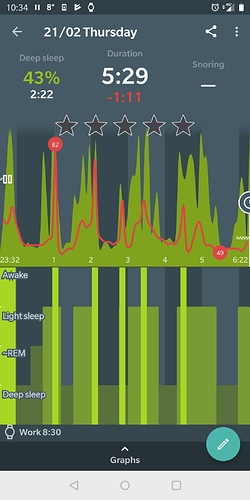Please consider adding a Smart Bedtime option that does not take sleep deficit into account.
The reason is, Sleep is not reliable at determining actual sleep duration, or at least not in my experience using MB2 with heart rate detection.
If Awake detection is turned off, it’s going to assume I’m sleeping as soon as it starts tracking. Although I do set a Delayed sleep tracking time, my actual fall asleep delay is far too erratic for that to be accurate.
If it’s turned on, it’s going to detect awake periods that I know for a fact never happened. This is especially common on heart rate spikes:
There was no interruption to my sleep that night.
The result is up to an hour removed from the real sleep duration, and by extension an excess of reported sleep deficit, thus an unreliable Smart Bedtime.
Perhaps get the latest beta (Feb 22) which has an entirely new method of REM detection. In the explanation of the sleep research that went into the change, it is part of the normal cycles throughout the night or whenever your sleep period is, for each cycle to have a very brief awakening that the subject might not be aware of happening. In other words, you’re “awake” but for such a short time that it is not noticed. And then a new cycle commences. The new REM algorithm seems bang on the nail correct in my experience.
Using the old system, you may not see how the cycles work.
I don’t know for sure, but getting the latest beta from the web site seems like a good way to get the correct data.
I’m just guessing, but it’s working for me.
That’s a fine suggestion, but doesn’t really address the issue. Sketchy awake tracking isn’t the only reason you’d want bedtime notifications to ignore sleep deficit. You might not always think to track your sleep; maybe you dozed off in front of the TV, took an unplanned nap in your car after lunch, went on vacation and didn’t bring your tracking gear with you, etc. It’s safe to say, as long as manual actions are required to trigger sleep tracking, the sleep duration stat is going to be skewed and not something to base lifestyle decisions on.
I agree that it’s still in a very early stage. I wear a Pebble Time virtually 24/7, so it needs to work with the wearable so that you can turn it off if your wearable is on charge. I think eventually, it should be able to work well. My Pebble Health sleep applet is far too aggressive and thus inaccurate but doesn’t mess much with battery at all.
Perhaps it’s a matter of time. I think I have the option turned off now, waiting for better reports.
